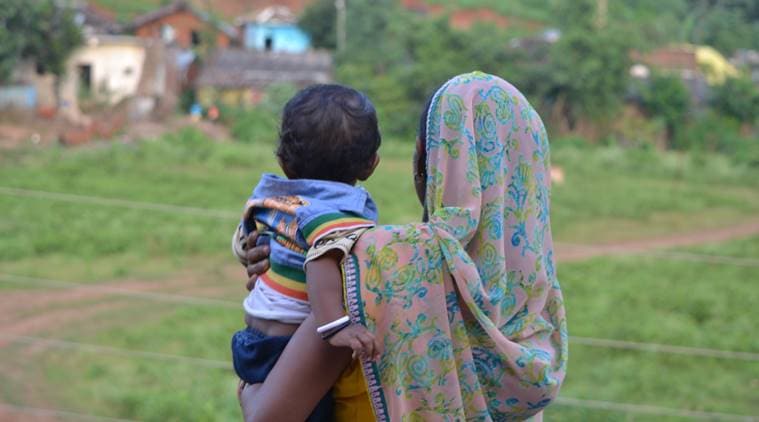 The IUCDs assume significance as birth spacing through family planning is considered as an important intervention for maternal and neonatal health. (Express Photo: Sajin Saju)
The IUCDs assume significance as birth spacing through family planning is considered as an important intervention for maternal and neonatal health. (Express Photo: Sajin Saju)
In early January, a 30-year-old woman gave birth to her second child. But dampening her joy was the realisation that a copper-based intrauterine contraceptive device (IUCD) had been inserted in her body without her consent.
The woman’s account is echoed by many others who allege that the IUCD, commonly known as Copper-T, was inserted in their bodies as well without their consent at a local government health facility in Samnapur block of Madhya Pradesh’s tribal-dominated Dindori district.
Recounting her ordeal, the 30-year-old says she was implanted with Copper-T despite her reluctance. “I had observed spacing between my first and second born child and told them that I am aware of the importance of birth spacing, but in spite of that they inserted Copper-T,” she says.
“Soon after the delivery, the nurse told me that the Copper-T has been inserted. When I asked why did she do it against my will, she responded saying it was for my good and convenience. I was in discomfort and bleeding profusely that night. Later, she came up with a form and sought my signature to show that this was done with my consent,” the woman recalls.
The IUCDs assume significance as birth spacing through family planning is considered an important intervention for maternal and neonatal health.
Identified as a high focus state by the National Health Mission, Madhya Pradesh carries the ignominious tag of being the state where infant mortality rate is highest in the country. As per the last National Health Family Survey for 2015-16, MP topped with 51 deaths of children less than one year of age per 1,000 live births. The corresponding ratio was even higher (54) in case of rural areas.
According to the Ministry of Health and Family Welfare, the copper-bearing IUCD provides effective, safe, and long-term, yet reversible protection from pregnancy. There are two types of IUCDs that are available under the national programme. While Cu IUCD 380 A is effective up to 10 years, Cu IUCD 375 is effective up to 5 years.
However, accounts of “forced” insertion of contraceptive device throw light on the murky side of the affairs.
“I pleaded with them not to put copper-T but the nurse slapped me instead and inserted it. Later, when I went to the hospital after a month to remove it, they sent me back saying it is not there. But the fact is I would have known had it been ejected,” says another woman, narrating her experience from two years ago.
“Nurse didn’t even inform me that she was planning to insert Copper-T. I had no clue about it. She inserted it under the guise of checking normally. It got expulsed on its own six days after my delivery,” recalls another woman.
Tribal women also allege complicity by some Accredited Social Health Activist (ASHA) at the village level. “The ASHA worker who accompanied me told me not to speak about the incident to anyone and that she would help me remove it,” says the second woman.
Refuting the allegations of forced Copper-T insertion, Block Medical Officer RS Thakur categorically says the procedure is done only after taking the consent and counselling. “Actually they are illiterate and most of them don’t have proper information about Copper-T. They think it is not beneficial and, hence, they believe nurses are forcing them,” says Thakur, explaining the “misunderstanding” prevailing among the tribals.
“It has minimal complication. If someone doesn’t understand the process, we don’t pressurise,” he says emphatically.
Concurring with Thakur’s view, Dindori Chief Medical and Health officer R K Mehra says the insertion of Copper-T cannot take place without the knowledge and consent of the patient. “The reluctance among the tribal women stems from the lack of knowledge about the method. The govt says Copper-T is the most effective way for birth spacing,” Mehra says.
Upon being prodded if hospitals have any target for Copper-T, Mehra says they try to convince as many women as possible to go for the birth spacing after the delivery. However, he says, “We reach only 30-40 per cent of our target as most of them opt out of it due to lack of cooperation from their families.”
Lata Wankhede, the state women’s commission chairperson, says her department has not received any complaint so far. “If this is true, we will take stern action against those who have indulged in such sort of malpractice. They should give the complaint in writing and we will take it forward with the authorities concerned,” she says.